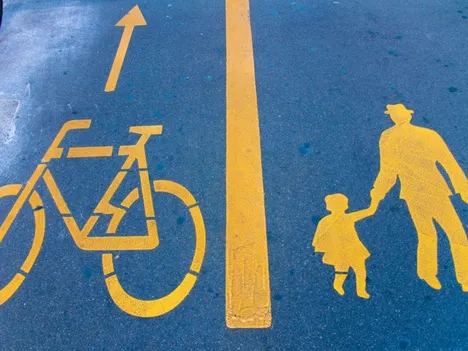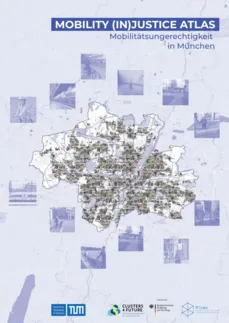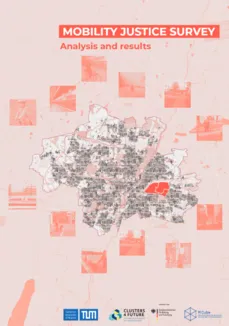MGeM
Mobilitätsgerechtigkeit in Metropolregionen

Hintergrund:
Das Projekt Mobilitätsgerechtigkeit in Metropolregionen (MGeM) ist eines von 14 Teilvorhaben in der ersten Umsetzungsphase (2021-2024) von MCube - Münchner Cluster für die Zukunft der Mobilität in Metropolregionen. Die MGeM-Projektleitung hat die Professur für Innovationsforschung, Dr. Alexander Wentland. MGeM legt den Grundstein für ein Mobilitätssystem, in dem die gesamte Bevölkerung der Metropolregion an der Zukunft der Mobilität teilhaben kann. Das Projekt adressiert sozial schwache Gruppen und Quartiere mit nachhaltigen Mobilitätsinnovationen als auch wissenschaftlichen Befragungen hinsichtlich des Mobilitätsverhaltens.
Projektziele:
-
Entwicklung einer deutschlandweit einzigartigen, interdisziplinären Mixed-Methods Studie zu Lebensumständen, Mobilitätsverhalten und Bedarfen sozioökonomisch schwacher Gruppen.
-
Erstellung eines Mobilitäts-Ungerechtigkeits-Atlas zur Darstellung räumlicher Disparitäten in Münchens stadtplanerischem Handlungsraum 3 (Berg am Laim, Perlach, Ostbahnhof, Neuperlach) unter Betrachtung der Indikatoren Erreichbarkeit, Grundbedürfnisse, Erholungs- und Bewegungsräume, Qualität von Verkehrsinfrastruktur sowie Umweltbelastungen.
-
Schaffung eines experimentellen Begegnungsraums als Beteiligungsformat vor Ort im Untersuchungsgebiet, um durch ethnografische Begleitung und Fokusgruppen-Interviews einzigartige qualitative Einblicke in das Wechselspiel aus Ungleichheit und Mobilitätskultur gewähren.
Projektergebnisse
Mobility (In)Justice Atlas
Where are mobility injustices in Munich? How can we visualize them? What are the critical areas? The Mobility (In)Justice Atlas aims to answer these questions to support policymakers, mobility advocates, and the general public understand how is the distribution of mobility resources and negative externalities among different social groups in Munich, Germany. In other words, the main goal of this Atlas is to identify and visualize mobility injustice in Munich, defined as areas where a high proportion of disadvantaged groups live in areas with fewer mobility resources or experience high negative effects of transport.
Mobility Justice Survey
What are the needs, experiences, and practices related to daily mobility for disadvantaged socio-economic groups? What is considered unjust in distributing mobility resources from the perspective of disadvantaged socio-economic groups? The main section of the analysis included in the report focuses on analysing the data based on the disadvantaged socio-economic groups. Based on these results, the following recommendations for practitioners have been made available to be considered for public transport infrastructure and service improvements, cycling and walking infrastructure improvements, and to make mobility fairer and more inclusive for all.
Auftraggeber:
Bundesministerium für Bildung und Forschung, Zukunftscluster-Initiative (Clusters4Future)
Laufzeit:
November 2021 - Oktober 2024
Kontakt:
Dr.-Ing. David Duran (david.duran@tum.de, +49 89 289 22510)
Sindi Haxhija, M.Sc. (sindi.haxhija@tum.de)

